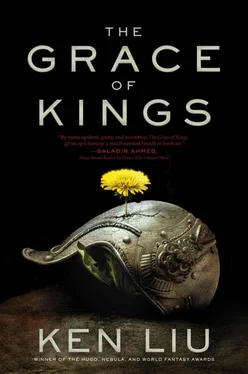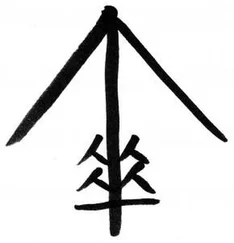Mira was the only one who spoke up in the silence that followed.
“Mocri fought you in the field with no tricks, trusting only that his strength would overcome yours. There was no shame in his loss. He is a hero who lost not because of any fault of his own, but because the gods had decided to put you in the world along with him.”
Mata hoped that someday the world would understand him as well as she did.

The Dasu army crossed the Liru in a giant flotilla of captured ships. They found Dimu an empty town.
With memories of their humiliating defeat in Géfica still fresh in their minds, the soldiers of Mi and Solofi had fled as soon as they heard that Marshal Mazoti had landed. She might be only a woman, but she was also a sorceress who could conjure ships out of thin air. What was the point of fighting? Might as well surrender or, even better, desert and find a way to get back to Géfica and be a farmer. Kuni Garu was said to be a good administrator who let the people figure out how to feed themselves without taking everything away in taxes.
Noda Mi and Doru Solofi were preparing to commit suicide in Dimu when Mazoti entered the city and captured them. She treated them well, in accordance with Kuni’s wishes.
Marshal Mazoti continued to march south from the Liru. The Dasu army arrived at Zudi, on the edge of the Porin Plains. The head of the garrison at Zudi, Captain Dosa, had always been thankful to Kuni for sparing his life; he and the elders of the city opened the gates wide and raised the flag of Dasu — begged from the officially licensed cooks of Dasu, with hand-painted scales and horns on the whales to turn them into crubens.

A few loyal men escaped from Zudi and brought news of Dasu’s victories to Wolf’s Paw. For a long time after hearing their report, Mata sat still on his throne. No one dared to speak up in the tent as the torches flickered and shadows danced across Mata’s stony face.
Torulu Pering was right: I must deal with Kuni Garu once and for all.
CHAPTER FORTY-SIX. MATA’S COUNTERATTACK
ZUDI: THE EIGHTH MONTH IN THE FOURTH YEAR OF THE PRINCIPATE.
Kuni’s return to Zudi brought tears from his father — who had finally decided that it was time to throw his lot in with the son who would not stop rebelling — and wild jubilation among the people.
To add to the good news, Puma Yemu had managed to rescue Jia and the children right from under the noses of the Cocru troops in a daring raid at Çaruza. The family would finally be reunited in their hometown.
Kuni waited at the city gates from morning until evening, when the torchlights of Puma Yemu’s men escorting Jia’s carriage finally showed over the horizon.
Toto- tika and Rata- tika had no memory of their father and shrank back when he held out his arms to them. The little girl clutched Jia’s hand while the little boy hung on to Otho Krin’s robe. “Who is that man, Uncle Otho?” Toto- tika asked before Soto shushed him, and Otho awkwardly backed away.
“Oh, you must be Fa-father,” said Rata- tika , stumbling over the unfamiliar word.
“The children will warm up to you soon enough,” said Soto to Kuni.
The momentary look of pain disappeared from Kuni’s face as he bowed deeply to Soto. “The Garu family is in your debt.” Soto returned with a deep jiri .
Then Kuni turned to Jia. Their embrace at the city gates lasted a long time as the citizens of Zudi clapped and whistled and laughed.
As Kuni repeatedly kissed Jia, he whispered into her ear, “I’m so sorry for everything you’ve suffered. I know you don’t think I understand, but I do. I’ve chewed on bitter herbs every morning so that I can feel a fraction of what you felt, alone, frightened, surrounded by enemies and trying to raise two children.”
Jia, who had always maintained a stoic face in front of the others, finally broke down. She hit Kuni in the chest, hard, a few times, and then pulled him to her in a hungry kiss. Tears and laughter mingled in her face.
Kuni took out of his pocket a small bouquet of dandelions, all wilted.
“They were fresh this morning,” he said apologetically.
“There will be new flowers,” she said. “Life moves in cycles, like the tide.”
“I want us to feel this close, always.”
“Then we must treasure the moments we have, for who can predict what tomorrow will bring?”
Kuni nodded, and there were tears on his face too.
The crowd continued to cheer as the couple went on holding each other, swaying slowly in the moonlight.

The reunion of the Garu household continued back in the mayor’s house, as joyous as it was awkward. No matter what kind of understanding Kuni and Jia might have shared, they understood that emotions and passions had a way of flowing along channels no one could anticipate.
Kuni introduced Jia and the children to Risana, who was very visibly pregnant. Soto and Otho Krin took the children away to play. Then Kuni seemed to have trouble finding things to say.
Mün Çakri went on and on about the tactical genius of Marshal Mazoti, and Jia politely said “Really!” and “Oh my!” in the appropriate places. After a while, Mün felt Rin Coda pulling on the hem of his robe under the table. He stopped talking. The room became very silent.
“Marshal Mazoti is thinking of planning an invasion of Rima. Mün, Rin, and I have to”—Than Carucono hesitated—“be somewhere else to help her.”
The three got up and left, discreetly closing the door behind them. Kuni was alone with his two wives.
“Honored Big Sister,” said Risana, “my heart is glad to finally be in your presence.”
“I should thank you, Little Sister,” Jia said, “for taking care of our husband all this time. His letters never mentioned how beautiful you are.”
The two women smiled at each other.

I can’t see.
Risana paced inside the bedroom that had been designated hers.
Jia’s heart had appeared as a solid piece of obsidian to her. She could not tell if she liked her; she could not tell if she hated her; she could not tell if she was sincere; she could not tell if she was trying to insult her.
She didn’t know what to do. Others whose hearts were sealed to her sight had only passed through her life. She had never had to live with anyone whose fears and desires she had to guess.
You’ve never learned to navigate the darkness, as the rest of us must.
Jia was glamorous, regal, a woman who had known Kuni when he was but a commoner. About her was the air of someone used to command and servants and wealth. But what was Risana? An entertainer, a woman who had scraped for a living from creating illusions for the amusement of teahouse patrons.
To delight and to lead.
The words sounded like a joke to her.
Then she looked into her own heart.
She forced herself to be calm. She would not be afraid. She would not see monsters where there were none.
Wasn’t acceptance of the truth about the self her talent? She would accept her limitations and strive to befriend Jia. There must be a voice next to Kuni who spoke for those just like her and her mother, the powerless who yearned for peace. She had come far and carved out a place for herself; Jia could be a powerful ally.
Читать дальше













